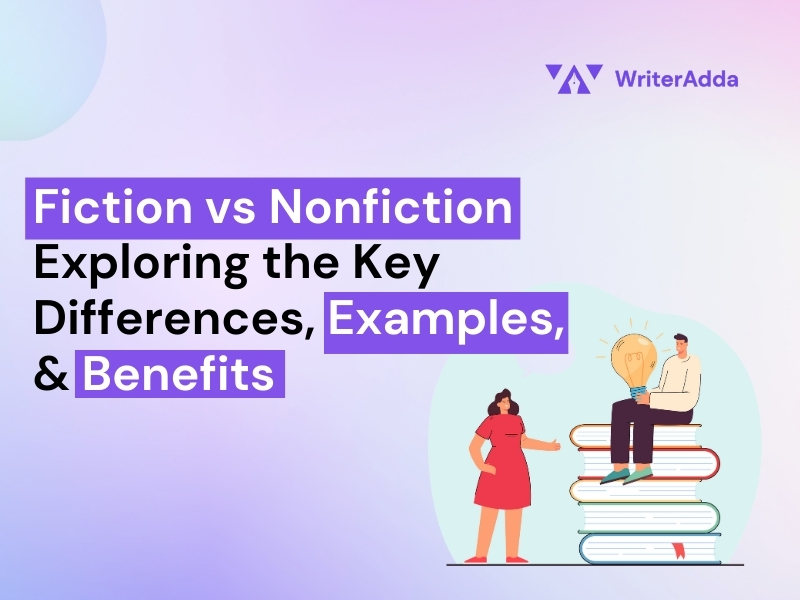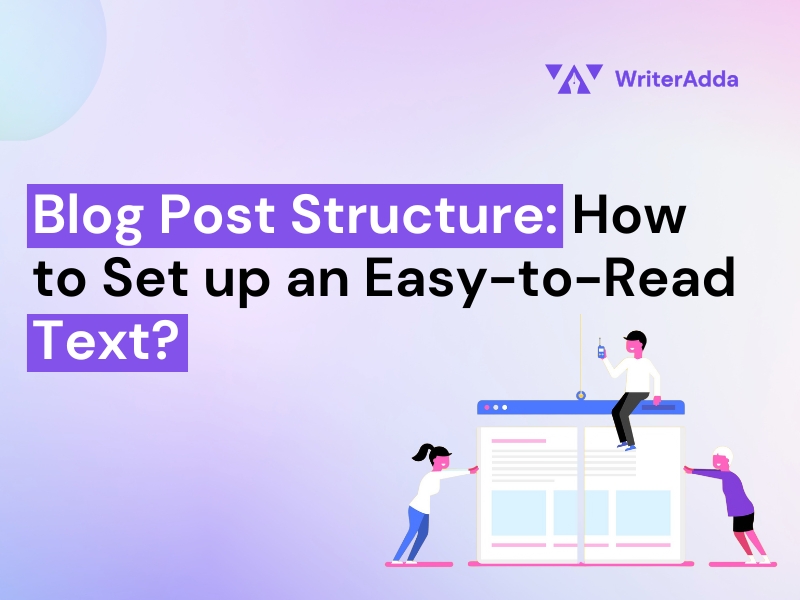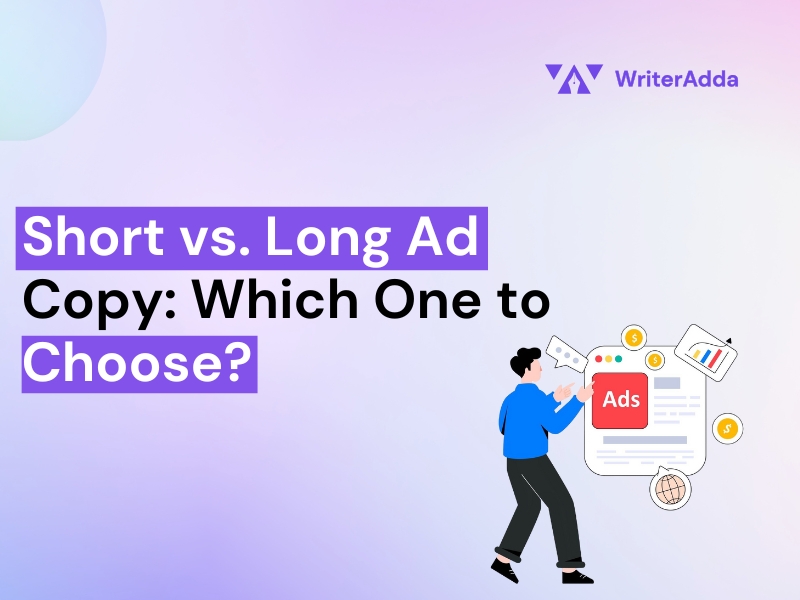In the dynamic world of literature, there are two distinct categories that stand out – fiction and nonfiction. Whether you’re fleeing into the imaginative world of fiction or delving into the raw truths of reality with nonfiction, each genre has its own uniqueness and charm. While both provide you with unique experiences catering to your interests and preferences, grasping fiction vs nonfiction differences is critical for successfully navigating the literary environment.
Whether you’re a passionate or an aspiring writer, understanding the differences and key elements of Fiction vs Nonfiction can help you choose your desired reading choices and writing style. In this blog, we will delve into the fascinating world of fiction vs nonfiction differences, provide examples of fiction and nonfiction, talk about how fiction and nonfiction influence learning, and discuss its educational benefits. By the end of this blog, you will get all the important insights on fiction and nonfiction to make informed choices about your writing style or reading preferences.
Understanding Fiction – Definition, Examples and Benefits
Before delving into Fiction vs Nonfiction Differences, it’s crucial to understand what exactly fiction and nonfiction are. Fiction is where imagination reigns supreme, and stories are crafted from the imagination of the writer by fantasizing about things. In this, the storyline is made using the author’s imagination, where the characters, setting, plot, etc., are from fantasy worlds rather than being related to real-life people, incidents, and facts. The benefits of reading fiction include boosting imaginative power, getting entertainment, exploring complex emotions, fostering empathy, reducing stress, cultural and historical insight, etc. Popular Examples of Fiction are:
- Novel
- Parable
- Short Story
- Stage Plays & Poetry
Understanding Nonfiction: Definition, Examples and Benefits
Nonfiction is the category where the stories are based on real-life facts, events, characters, and occurrences rather than from the author’s imagination. Such stories deal with truth and facts on certain important topics like current events, past cases, historical events, etc. The benefits of reading nonfiction include inspiration, knowledge acquisition, empowerment, self-help, personal development, problem-solving, critical thinking, overcoming obstacles, and many more. Examples of nonfiction are:
- Memoir
- Autobiography
- Biography
- Textbooks
- Philosophy & Theory
- Essays
- Self Help books
- Science texts
- History books
Comparing the Contrast of Fiction vs Nonfiction
If you are thinking about how to tell if a book is fiction or nonfiction, there are several differences between both to help you understand and analyze their category. Have a look at the fiction vs nonfiction differences:
Reality vs Imagination
The biggest Fiction vs Nonfiction difference is fiction is based on imagination whereas nonfiction is based on reality. Fiction encourages readers to enter the imaginary world of scenarios and resonate emotionally. Nonfiction, on the other hand, is factually correct and real that presents real life events, people, scenarios and ideas. It provides information on past or present events or occurrences, real time knowledge and understanding.
Purpose
The purpose of fiction writing is to entertain people, evoke emotions, and provoke thoughts. Nonfiction stories are written to educate the audience and convey information based on some person, place, event, incident, or real-life experience.
Content
Fiction stories include invented characters, plots, settings, events, and situations that may or may not be related to any reality. Nonfiction presents factual information based on real people, events, situations, and ideas that are supported by research and evidence.
Sources
While writing fiction, authors use their imagination, experiences, and emotions to craft entertaining, comedy, romance, thriller, etc., stories. In nonfiction stories, the content and characters rely on credible sources, evidence, research, and interviews to provide correct information.
Flexibility
Fiction stories are imaginative, and the author has the flexibility to mold the story as they wish. The flexibility in narrative style, plot development, plot twists, structural style, and character arcs makes such stories unpredictable and filled with suspense. Nonfiction stories are more structured, timeline-based, evidence-based, and prioritize the logical flow of information.
Truthfulness
Fiction stories can or cannot be true as they involve imagination and fabricated elements that do not reflect reality. Nonfiction is mostly true as it presents real-life facts, events, people, and ideas.
Impact on the Reader
Fiction can influence emotions, imagination, belief, empathy, and perception, shaping the reader’s understanding of human experiences. Nonfiction informs, educates, and motivates action by providing insights into real-world challenges and occurrences that pique intellectual interest.
Genre Conventions
Fiction includes various genres, such as romance, mystery, science fiction, crime, thriller, fantasy, suspense, and horror. Nonfiction genres include memoir, crime, history, business, politics, motivational, biography, self-help, personal development, and essays.
Writing Styles
“Fiction vs Nonfiction Writing Styles” compares how authors compose imaginative stories against factual records. Fiction writing style uses descriptive language to craft compelling narratives, invent unique settings, develop engaging plots, and choose various narrative perspectives. Nonfiction writing style follows a logical and well-structured format with clear instructions, straightforward language, and an objective tone to provide reliable information.
Key Elements of Fiction vs Nonfiction
What makes a fiction or nonfiction book great and perfect is its elements. Whether it’s fiction or nonfiction, there are a few special elements or components that are necessary to maintain the essence of the category and keep the audience’s interest until the end.
Key elements of Fiction stories
- Compelling characters that are relatable and multi-dimensional
- An exceptional opening that captures the reader’s interest
- A captivating and engaging storyline
- Rich and thought-provoking theme with an underlying message
- Distinctive style and voice
- A vivid, detailed, and unique setting
- Plot twists that can surprise the readers
- Authentic and relatable dialogues
Key elements of Nonfiction stories
- Focused on real-life people, events, experiences, and issues
- They should be factually correct and are grounded in truth
- Clear and easy to understand
- Follow a narrative structure
- Must include citations, references, evidence, and interviews
- Compelling storytelling along with logical flow
- Must fulfill the specific purpose or message
- Inspirational and motivational elements
Famous Examples of Fiction and Nonfiction Books
Choosing Between Fiction and Nonfiction Books is a difficult choice, especially if you are an avid reader who loves to read everything. There are an array of popular fiction and nonfiction books that you can choose according to your interests and preferences. Have a look at some popular examples of Fiction and Nonfiction:
Examples of Fiction Books
- To Kill a Mockingbird by Harper Lee
- 1984 by George Orwell
- And Then There Were None by Agatha Christie’s
- A Walk to Remember by Nicholas Sparks’
- The Harry Potter series by J.K. Rowling
- The Great Gatsby by F. Scott Fitzgerald
- The Lord of the Rings series by J.R.R. Tolkien
- The Richest Man in Babylon by George Samuel Clason
- Hamlet by William Shakespeare
Examples of Nonfiction Books
- The Diary of a Young Girl by Anne Frank
- A Brief History of Time by Stephen Hawking
- The Immortal Life of Henrietta Lacks
- Talking to Strangers by Malcolm Gladwell
- 7 Habits of Highly Effective People by Stephen R. Covey
- Walden by Henry David Thoreau
- Slouching Towards Bethlehem by Joan Didion
- Sapiens: A Brief History of Humankind” by Yuval Noah Harari
- Into the Wild” by Jon Krakauer
Educational Benefits of Fiction vs Nonfiction
When it comes to fiction vs nonfiction for students, there are several educational benefits of both: it helps students understand more about life, stimulates personal development, teaches unique skills, and extends their perspectives. Have a look at the Educational Benefits of Fiction vs Nonfiction:
Benefits of Reading Fiction
Enhances Imagination and Creativity: By reading fiction, students get the ability to think outside the box and visualize vivid settings, scenarios, characters, and perspectives, which ultimately stimulate imagination and creativity.
Develops Empathy: Fiction exposes readers to diverse characters, plots, perspectives, situations, and experiences, fostering their empathy and understanding of other people’s situations and emotions.
Enhances Vocabulary and language skills: Fiction stories include rich, vivid, and varied vocabulary, unique writing styles and literary devices that enhance students’ fluency and language skills.
Explores complex themes: Fictional stories explore complex themes such as empathy, identity, morality, social issues, struggles, etc., which prompt readers to understand different themes and perspectives and broaden their mindset.
Promotes Critical thinking: The Impact of Fiction vs Nonfiction on Critical Thinking is an important benefit of both fiction and nonfiction. Both the genres promote critical thinking by exposing readers to varied themes, character motivations, plot developments, sudden twists, and turns, etc., which promote their ability to understand complex narratives.
Benefits of Reading Nonfiction
Acquiring Knowledge: Nonfiction provides students with factual information about a wide range of topics from history, science, and politics to culture, personal development, current events, biographies, and autobiographies. This expands their knowledge and understanding of the world.
Inspiration and motivation: Real-life success stories like biographies and autobiographies of successful leaders, politicians, cricketers, freedom fighters, etc., impart motivation and inspiration to the students and implement such practices in their own lives.
Practical skills and strategies: Nonfiction books often provide actionable advice about life problems, complexities, and fears. They can benefit personal productivity, money management, effective leadership, business management, marketing techniques, negotiation skills, and more.
Personal development: Nonfiction books offer advice and insights into personal growth, time management, self-improvement, achieving goals in various aspects of life, setting goals, enhancing productivity, and leading a more fulfilling life.
Developing research skills: Reading nonfiction allows students to evaluate sources and their credibility, analyze information, draw conclusions as per evidence, etc., ultimately fostering research and analysis skills.
How Fiction and Nonfiction Influence Learning
Fiction and Nonfiction both significantly influence learning. Fiction promotes emotional engagement, empathy and perspective-taking, critical thinking and analysis, cultural and social awareness, imagination, and creativity. It allows readers to interpret symbolism, understand character developments, analyze situations, gain critical thinking ability, and more, which boosts their ability to think outside the box.
Nonfiction allows readers to expand their knowledge base, develop expertise in specific topics, boost research skills, improve analytical thinking and problem-solving, and promote self-improvement and personal development. It allows readers to gain insights into real-world issues, challenges, events, scientific discoveries, social trends, etc., and apply such knowledge to real-life situations.
Integrating Fiction and Nonfiction in Academic Curriculum offers various benefits such as literary analysis and critical thinking, empathy and understanding, language and communication skills, writing skills, real-world knowledge, problem-solving, cultural and historical awareness, and many more. These skills help students improve their cognitive, social, emotional, and linguistic abilities and navigate life’s problems fearlessly.
Conclusion
In conclusion, we can say that both fiction and nonfiction are important parts of literature as both offer different benefits to the readers. We have discussed the meaning, differences, benefits, and key elements of fiction and nonfiction, which can help you understand both genres in detail. Besides that, we have also suggested some popular examples of fiction and nonfiction books that can help you widen your perspective, learn new skills, enhance your vocabulary, boost critical thinking, and promote personal development. So, choose your preferred genre, pick your favorite book, and immerse yourself in the engaging world of fiction/nonfiction.




